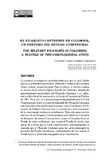Mostrar el registro sencillo del registro
El Vicariato Castrense en Colombia, un vestigio del Estado confesional
| dc.rights.licence | Atribución-NoComercial-SinDerivadas 4.0 Internacional | * |
| dc.contributor.author | Cuadros Carrascal, Santiago Camilo | |
| dc.date.accessioned | 2019-07-12T19:44:08Z | |
| dc.date.accessioned | 2020-04-15T13:41:41Z | |
| dc.date.available | 2019-07-12T19:44:08Z | |
| dc.date.available | 2020-04-15T13:41:41Z | |
| dc.date.created | 2019 | |
| dc.identifier.issn | 1794-5216 | spa |
| dc.identifier.uri | http://hdl.handle.net/10554/43793 | |
| dc.description.abstract | La presente investigación pretende demostrar que las actividades que en la actualidad desarrolla el Obispado Castrense de Colombia tienen carácter inconstitucional. Para el efecto, el artículo analiza la historia de la relación Iglesia-Estado en Colombia, ahondando particularmente en el ámbito del Obispado Castrense, y la viabilidad jurídica de dicha institución a la luz de la Constitución Política de 1991. Para ello, se contrasta la posición planteada por la Corte Constitucional sobre la constitucionalidad del Obispado Castrense con la justificación jurídica que la misma vicaría Castrense y el Ministerio de Defensa Nacional dan a la existencia y funcionamiento de la mencionada institución actualmente. Todo esto para concluir que hoy día el Obispado Castrense ejerce actividades en Colombia en desmedro de nuestra Carta política, como si Colombia fuese un Estado de corte confesional, por cuanto el Estado ha hecho caso omiso de lo dicho por la Corte Constitucional. Adicionalmente, se constata que el Obispado Castrense goza de ciertas prerrogativas por parte del Estado colombiano, contrariándose de esta manera el Estado Laico y pluralista consagrado en la Constitución. | spa |
| dc.rights.uri | http://creativecommons.org/licenses/by-nc-nd/4.0/ | * |
| dc.source | Universitas Estudiantes, No. 19 (enero-junio 2019) | |
| dc.subject | Concordato | spa |
| dc.subject | Constitución política | spa |
| dc.subject | Estado laico | spa |
| dc.subject | Obispado Castrense | spa |
| dc.title | El Vicariato Castrense en Colombia, un vestigio del Estado confesional | spa |
| dc.title.alternative | The military vicariate in Colombia, a vestige of the confessional state | spa |
| dc.type | info:eu-repo/semantics/article | |
| dc.type.hasversion | http://purl.org/coar/version/c_ab4af688f83e57aa | |
| dc.subject.keyword | Concordat | spa |
| dc.subject.keyword | Political Constitution | spa |
| dc.subject.keyword | Lay state | spa |
| dc.subject.keyword | Military bishopric | spa |
| dc.description.abstractenglish | This investigation reflects how at present the Military Bishopric of Colombia develops its activities in an unconstitutional manner. For this purpose, the article analyzes the history of the relationship between the Colombian State and the Catholic Church, delving particularly into field of the Military Bishopric, and the legal viability of this institution in accordance with the 1991 Political Constitution. Whereby, it is contrasted the position of the Constitutional Court on the constitutionality of the Military Bishopric, and the legal justification that the Military vicariate itself and the National Ministry of Defense give to the existence and functioning of the aforementioned institution at present. Concluding that today the Military Bishopric exercises activities in Colombia to the detriment of our Constitution. As if Colombia were a state of confessional style because the State has ignored what the Constitutional Court said, additionally, it is verified that the Military Bishopric enjoys certain prerogatives granted by the Colombian State, infringing in this way the Lay and pluralist State enshrined in our Constitution. | spa |
| dc.type.local | Artículo de revista | spa |


